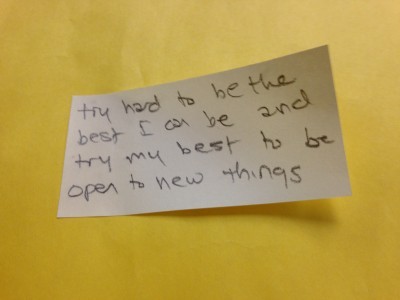It was a normal Thursday afternoon. I pulled my red Prius into the garage after a long day at school, ready for the weekend. Our car ride chatter was nothing short of normal -- with my teenage son, I've learned that some days are talking days, and some are best to be left quiet -- and that words matter. Today we talked about the day, his classes, homework, and what he needed to do that night. As the radio clicked off and he swung his long legs onto the garage concrete, I heard him whisper, "Whoa, deja vu."
"Whispers from your former life, bud," I commented as I pulled my bulging bag of papers out of the back seat.
"No -- not a former life, Mom. This has happened before. It's the same thing," he snapped back. Guess he's not ready to believe in past lives just yet.
"Seriously, Cam. When we have deja vu it's you repeating what you've experienced in another time. It's part of the Universe," I patiently tried to persuade him.
"No, it's not. I've done this before. In this life," he shot back as the door closed behind him.
And we were done.
I've noticed that conversations with him require intense concentration. They are short, deliberate and to the point -- or they're not. Sometimes they're full of hidden meaning, of twists of language, or simply a game of trying to appease my questions and get me out of the room.
As a writer and his parent, this does not satisfy my quest for stories, to use language to share emotions, to delve into the insides of his brain, or even to recount how he made his chicken/pasta concoction taste like something from a Food Network chef.
But it does start me thinking about words, and what happens when we focus on what we're saying. In my classroom, I'm forever telling my 8th graders that English class is to learn to communicate -- to use written and spoken language to understand each other, to share history, to create an understanding of the human experience.
I want my students AND my children to feel the urgency to use words to learn and move forward with the magic of life, and to always remember where we came from.
For writers, the written language is our sustenance. Moving pen on paper or fingers on a keyboard brings vigor to our veins and joy to our world. Writers teeter between words gushing out and over and tumbling down our bones as a waterfall carries the current, debris tossed in with beauty. We then sort and shift and question every single word, each letter becoming part of a canvas for our emotions and thoughts and stories. We can squeeze out language in the most excruciating fashion, hovering for days to capture that precise moment stuck in our minds and begging release into the world.
This consciousness of language, of purposefully and deliberately thinking about the words we put into the world, becomes at times both painful and pleasurable. Head down, we squint to see a story take shape, to illuminate the shadows of our world with words chosen with calculating concentration. We seek to be understood, to create community with our words, searching for the beautiful connection that comes when the reader pauses, looks up to wipe a tear or breaks into giggles. And we struggle with the pang of unkind comments, misunderstood intentions, and careless words flung thoughtlessly into the universe.
Writers know how much easier it would be to dismiss our thoughts, to brush them off and become part of the unconscious masses who struggle to put together 140 coherent characters. We understand the ease of dashing off an idea, pushing submit and walking away, and yet we continue to push through the pain of process. Why? To nourish our souls, to spread joy and understanding and passion and consciousness and hope that someday, in that deja vu moment, someone will call forth an experience and smile, reach out their hand, and make the world just a touch more beautiful.
That's what happens when we focus on our words. We compose a wholehearted life. We create the kind of world we want to live in, for now and forever.
This piece was originally published on mamawolfe.
